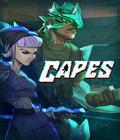Rival Games CEO Jukka's issued a lengty statement on why this happened:
The last year has been tough. Beyond tough. As a company, as an entrepreneur, and as a human being. The raging coronavirus is just the icing on the cake, and by no means the one to blame. The saying “when it rains it pours” has a certain truth to it.
First Steps
I would never have guessed that when we started over 7 years ago, while still in school and with no experience in the gaming industry nor even in the IT business, that we’d have such an emotional rollercoaster ahead of us. Back then, we were naïve, aimed big and dreamt even bigger. We were noobs. Telltale Games had just had their breakthrough with The Walking Dead Season One, showing the world that video games can deliver emotional, interactive storytelling experiences for the vast audiences. Developing a crime noir story with a similar episodic format, branching narrative and light point n’ click gameplay felt like a no-brainer. We even won a couple of different local and national business accelerators, giving us a boost of confidence and our first team members (of which some remained until today).
Looking back, our first game, The Detail Season One, took about 3.5 years to develop, even though honestly we worked full-time only a couple of years. The reason was the first hard-earned lesson: never build your runway on expected sales from an unlaunched/untested product. The game has sold 92,110 episodes on Steam and an additional 56,467 episodes on other digital stores on PC, Mac, and Linux. On iOS, the figures are close to the same except there the game has been for free for a while already. Still, looking at the numbers and the budget per episode, The Detail was break-even for us as a business case.
On the grand scale, The Detail managed to open the doors to 3rd party IPs, and through luck (right place, right people), I managed to meet with Skybound Entertainment, most known for The Walking Dead franchise. We started talking with their interactive branch, and I can proudly say that I’ve made a lot of good friends from there during the years. We started working on Thief of Thieves: Season One, since it was more or less like Skybound’s Ocean’s Eleven and felt like a perfect fit for us.
Learning the Ropes
While in early development, we grew the company from under ten people to almost twenty. Since we are located in a smaller city in Finland, experienced people were hard to come by and we ended up hiring a lot of junior talent. Hell, we were still juniors ourselves at that point. We tried to do everything ourselves, an effect of the invincibility syndrome that is too common with young teams without experience juggling scope, budget, funding, and marketing.
Skybound showed their support for us from day one. They gave us access to the talent behind the comic, valuable feedback throughout the development, help with marketing and PR, and they helped us promote the game at major events like San Diego Comic-Con. They even turned a part of their studio into a recording booth to help us get the best possible voice talent for the game. But at the end of the day, it all comes down to the players first finding the game and then buying it.
While we worked on the game, Steam went through a major content explosion by opening up the platform to everyone. After the moderate success of The Detail, we had our hopes up high, but we were disappointed by the sales of the game. Neither Xbox nor Switch did much better. The game wasn’t finding its audience. I knew that it would be a major hurdle down the road.
During production, we had to raise more project funding from an external venture capital fund for the game so that we could ship it. We had no real budget for marketing nor the in-house skills to do so. We had a clear schedule and milestones tied to the funding, so we really didn’t have much room to maneuver. This, combined with the sales and the development problems, was a financial recipe for disaster for the company: I understand now that loan-based project funding is a bad fit for a gaming studio, and Rival Games became a highly indebted company due to it.
In space, no one can hear you scream
We had just signed a deal to work on the legendary Alien franchise for the first time on mobile, and the spirit within the studio was higher than ever. We also had another, experienced studio (Theory Interactive) helping us on the next title and a publisher (D3 Go!) that we trusted and really enjoyed working with. For the next 7 months we did almost everything with an improved process: we had solid pre-production, a clear and time-wise in-scope vision for the product, and a team that was humble and ready to listen to each other and our partners. We worked long days at the office, sometimes feeling tired but always motivated and focused on a common goal.
The end result, Alien: Blackout, speaks for itself: 95/100 on GamesBeat, part of Best on iOS 2019 picks from Apple, and a lot of positive reviews and feedback from fans of the franchise. It was the first game we really showed our capabilities as a gaming studio and the whole game was done is just 7 months. Even with the disappointment of shutting down the studio today, this is the game that we can all be proud of for years to come, especially since there aren’t too many positively received entertainment products from the Alien franchise in the recent years.
Work-life balance
However, I recently understood that while we were working on the game, I broke the one and only rule I set for the founders of the company: always family first. My wife was expecting our second child and I was working long days at the office, and I became obsessed with making sure the game is as good as possible. The same probably applies to everyone in the team, since we shared love and passion for the franchise.
There is a saying that entrepreneurship costs marriages, and I understand that now, even though thankfully we are still together with my wife. It is hard to understand or to explain how emotionally consuming it is to try to be present at home, when your mind is trying to figure out how you can pay your team’s salaries next month. I’ve always tried to make sure the team comes first: even in tough times, I’ve tried to get at least some salary to the team members that need it the most. It might have not always been the best practice business-wise, but I like to think that it has been one of the key reasons why our team has stayed together for so long, even with the ups and downs. People first. Always.
However, from the entrepreneur’s perspective (and some of the key team members/founders perspectives) this usually means months and months with minimal or no salary. Something which is equally hard to understand or to explain at home: I’m always at work but rarely get paid enough for it to bring my share of bread to the table.
The Lucky Streak Ends
After Alien, things were looking up for a while. We signed a deal with Universal Studios for a super cool smash-up of two 80s iconic franchises for an AA PC/console narrative shooter. We had a solid team, with some serious experience, and the same development partner from Alien, a solid vision for the game, fun and challenging gameplay. In short, all the shenanigans for a great, innovative game and a good business structure for the project, that even would’ve allowed us to pay back the loans for Thief of Thieves. We were months in the pre-development when, almost a year ago, the worst possible happened: Universal had a major business strategy shift across their portfolio, shutting our project down in a moment’s notice. We were coming up on a milestone that contractually allowed them to shut it down fast.
Universal did try to find a publisher together with us for the game to a certain degree, but we’d never prepared for pitching it to external publishers, so the materials were nowhere near to convincing anyone. We had to temporary layoff most of our team (wasn’t the first time) and shift focus on pitching our various original game ideas to different publishers.
The main project we pitched was The Greenhouse Effect, a third person story experience in a world where climate change has made everyday living a challenge. Here’s the early prototype trailer.
We had a build, a story deck, budgets, team, unique art style. In short, a solid vision on what the game is and what kind of a story it will tell, and the team and tools the execute that vision.
Yet, it will never see daylight. We had no resource to really make something unique that could’ve stood out enough in the eyes of the publishers, since we were running on fumes. Another problem we had was the budget: we were aiming for somewhere between $2 million and $4 million, and there aren’t many partners out there in that certain segment. The feedback for the past 6 months has been either “it is not a good fit for our portfolio” or “it is under/over our current budget scope”. Neither of these gave us any concrete feedback on how to improve the pitch itself, so we ended up creating additional prototypes and a mobile version to no avail.
While we were doing this, I was also pitching to VCs and potential partners about additional funding. None worked out, and I understand why: we were a company that had been around too long, never becoming profitable or even making any serious revenue ($825,000 in 2018 was our best). Upon close inspection, we were deep in debt and needed long-term financing to even have a chance to turn profitable.
The Chips Run Out
However, we still had some potential partnership opportunities and publisher negotiations going on at the beginning of this year. I was feeling optimistic about them. I guess I’m a “glass half full” kind of guy that doesn’t give up. Then something happened that I nor the world was prepared for: a global health crisis in the form of a coronavirus. It shut down all the leads that we had and left us lost in the dark with no way out. I know we are not the only ones there, and I hope that at least some will find a light to guide them through the darkness.
Governments around the world have kicked various kinds of help for companies, and Finland has always been known for its government support for businesses. They were no exception this time around: hundreds of millions of dollars are being granted to companies to help them make it through the state of emergency. Yet, since we are deeply in debt and have had major financial losses from Thief of Thieves, such a grant was not applicable for us. They’ve funded us throughout the years, and we wouldn’t have made it here without them, so nothing but love from us to the Finnish government and their support.
Which brings us to present. It has been quite a ride. I’m humbled by the confidence the team gave me over the years. I wish all the best to everyone who has worked at Rival Games throughout the years. As a team, we are thankful for the support of our great partners, members of our Board of Directors, advisors, investors, new friends we’ve made across the globe, the guidance and help they’ve provided over the years, and hopefully some of us will get a chance to work with some of you in the future. For now, it is time to spend some time with the family, think about the lessons learned, and the future. Then maybe it is time for a new adventure.
With gratitude,
Jukka Laakso
CEO @ Rival GamesP.S. Thief of Thieves: Season One and Alien: Blackout will remain in stores normally, but our first title The Detail will be pulled from Steam and AppStore at some point.








